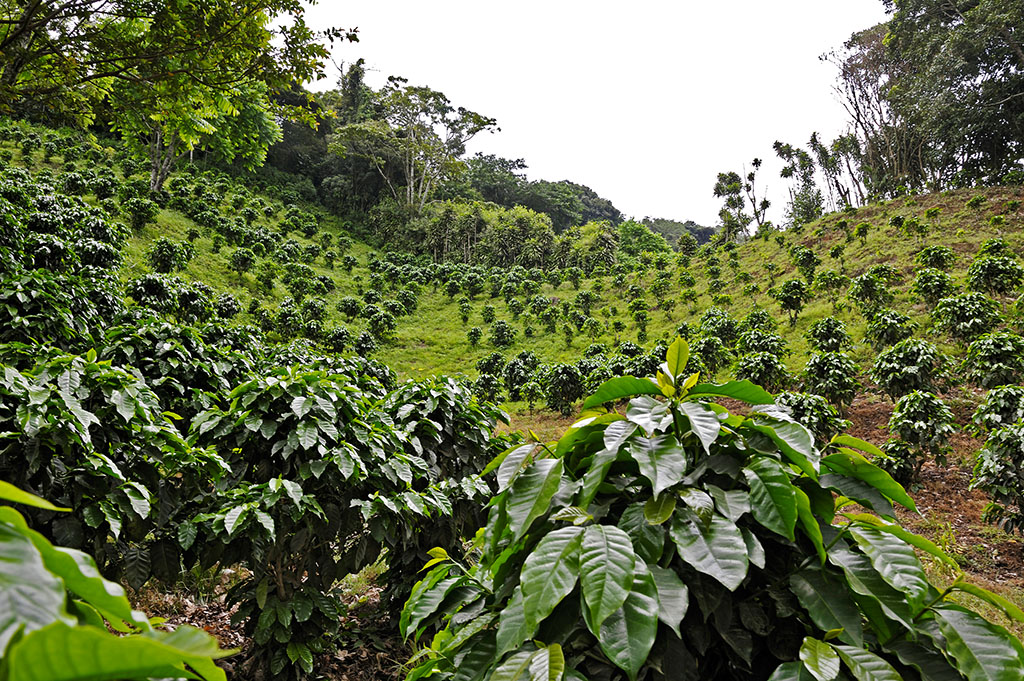Yunnan Coffee Pu'er Coffee
Pu'er, a heaven-given treasure land, is not only the source of tea in the world, but also an important coffee producing area in China. Both planting area and output account for half of China's coffee, and it is a veritable coffee capital. In recent years, the Pu'er coffee industry has developed rapidly and has formed a complete coffee industry chain from planting to processing. Pu'er coffee has been exported to more than 30 countries and regions in America, Europe and Asia, exporting 28200 tons of coffee and earning 69 million US dollars in foreign exchange.
Current situation | Pu'er Coffee emerges as a new force
From the global coffee distribution map, Pu'er, which is located on the coffee belt in the north latitude, has the natural advantage of coffee cultivation. It has a history of more than 100 years since the introduction of coffee from other countries after Simao opened trade in modern times. Pu'er coffee was planted on a large scale in 1988, and now the planting area has reached 756000 mu, with an output of 40, 000 tons. The municipal party committee and zhengfu attach great importance to the development of coffee industry and regard it as a supporting project of agriculture with plateau characteristics.
In 2013, "Pu'er Coffee" and "Simao Coffee" obtained the certification trademark of geographical indications of agricultural products of the State Administration for Industry and Commerce and the registration certificate of geographical indications of agricultural products of the Ministry of Agriculture. In 2014, the State Administration of quality Supervision approved Pu'er to establish a "National Coffee Industry well-known Brand demonstration Zone", becoming the country's first demonstration zone for the creation of well-known coffee brands. The coffee industry of Pu'er has benefited more than 251500 people from 75000 households in 83 townships (towns) in 10 counties of the city, and at the same time it has led to the planting of 300000 mu in Myanmar, Laos and other neighboring countries. At the end of 2014, the State Administration of quality Supervision and Administration formally approved Pu'er to establish a national key laboratory for coffee testing (Pu'er), becoming the only national professional testing laboratory for coffee products. The implementation of these measures will strongly promote coffee trade and promote Pu'er coffee to become a well-known brand. It can be said that Pu'er coffee is in a period of vigorous development.
Mr. Chen, from Xinglong, Hainan, said that Pu'er has obvious advantages in developing the coffee industry. Compared with Hainan, Pu'er is higher in altitude, suitable for coffee growth and more suitable for cultivating high-quality coffee. Secondly, Pu'er has a wide land area and abundant labor force, which provides conditions for the development and growth of the coffee industry. Thirdly, the strong support and publicity of zhengfu has created a good atmosphere for the development of the coffee industry.
Labor pains | A necessary stage in development
Pu'er has become the main coffee producing area and the main distribution center of coffee trade with the largest planting area, the highest yield and the best quality in the country, but there are still some problems to be solved in the process of development.
According to Martin, an American expert at Gulinfang Coffee Yunnan Laboratory, although Pu'er coffee has reached a certain scale in terms of output and planting area, most of it is still commercial beans and has no awareness of fine products. Many farmers do not have a correct understanding of the coffee they grow, they only want output, do not pay attention to quality, and do not have strict and unified standards for the cultivation, management, harvest and storage of coffee. In order to increase the yield, some farmers pick coffee before it is ripe, and the quality of coffee varies.
According to coffee experts in Malaysia, Vietnam, as the world's largest coffee exporter, has a similar situation. During the coffee picking period, Vietnamese farmers often spread a woven bag under the coffee tree, and all the coffee is picked together, and the quality is definitely not guaranteed. This is a sign that there is no sense of boutique. Therefore, the added value of coffee is very low.
In addition, there is no habit of drinking coffee in China at present. The instant coffee that many people drink does not really reflect the original flavor of coffee, strictly speaking, it can not be regarded as having drunk coffee, which is why many people mistakenly think that all coffee is the same flavor. Many people go to cafes but drink mostly juice, but not many people drink coffee. They go to the cafe not so much to drink coffee as a symbol of status or trend. The general mentality is: I went to Starbucks, not me for coffee.
This also shows that this is a necessary stage in the development of coffee. There has to be a transformation.
Way out | develop boutique coffee
What is boutique coffee?
Li Jiahong, a coffee expert in Malaysia, says that in fact, coffee is the same as red wine. As long as a good red wine is tasted by a wine taster, you will know which estate and year it comes from. Boutique coffee is the same, all have their own flavor and taste, like the "fingerprint" of coffee. To have this quality, every coffee farm should have a set of strict production standards and management system, from coffee planting, picking, warehousing, roasting and other processes have strict requirements. Moreover, these standards are internationally recognized, so that the coffee can meet the standards of fine coffee.
Take Pu'er 's Aili coffee as an example, it first has its own coffee planting base, using the rainforest coffee planting model, planting coffee in the rainforest, instead of cutting down trees and planting coffee seedlings in the traditional way. instead, tall trees are allowed to provide a natural shade for coffee growth, making use of the natural conditions of the rainforest to "shade" and "moisturize" coffee trees to grow first-class coffee. The fallen leaves of trees in the rainforest can also be used as fertilizer for coffee trees, which not only protects the environment, but also makes coffee grow better. Moreover, pests like to lay eggs high, and the rainforest can protect coffee trees from fewer diseases and insect pests. In addition, the rainforest can maintain temperature balance, resist frost and prevent coffee from being harmed by frost. The raw coffee beans and roasted beans (powder) produced by the company have passed the organic product certification of China and EU. The first processing equipment of peeling and degumming integrated coffee was introduced from Colombia, and two wet processing plants of peeling and degumming were set up in Guide and Manzhongtian, processing 10 tons of fresh coffee fruit per hour. Each peeling and degumming wet processing plant is equipped with solar coffee drying system to ensure the quality of shelled coffee beans in the drying process.
Boutique coffee focuses on quality, and the price is naturally much higher than that of ordinary commercial coffee. Wang Jiantao, founder of boutique coffee in Hong Kong, said that boutique coffee can not only promote the development and growth of the coffee industry, but also increase farmers' income and arouse the enthusiasm of farmers to grow. As the enthusiasm of farmers increases, they will consciously grow and manage coffee in accordance with international standards, and even carry out technological innovation to produce more high-quality high-quality coffee, forming a virtuous circle of the coffee industry chain.
Key | training professionals
In order to promote the development of the coffee industry, we must first have people who understand coffee. According to reports, at present, there is a shortage of coffee professionals in China, and many people have almost zero understanding of coffee. In Europe and the United States, the income of coffee experts is very considerable, so it is very necessary to train coffee professionals. The reporter has also learned that many farmers have grown coffee for many years, but they have not yet drunk coffee.
Gulinfang Coffee Yunnan Laboratory settled in Pu'er like timely rain, which is very much in line with the needs of the development of Pu'er coffee industry.
According to Zhu Hewen, the main person in charge of the Gulinfang Coffee Yunnan Laboratory, the laboratory is authorized by the American Fine Coffee Association and is the only organization in southwest China that is qualified to conduct coffee appraiser training and examination. it is a partner of the International Coffee quality Research Institute in China, with the main goal of training coffee professionals, mastering the coffee market and professional standards, and promoting Pu'er coffee to the world. At the same time, the existence of such institutions can also attract coffee merchants, enthusiasts and experts from all over the world to study in Pu'er, improve the popularity of Pu'er coffee and inject intellectual support for the development of Pu'er coffee.
On July 11, coffee tasters from the United States, India, South Korea, and other countries came to Pu'er to take part in the training and examination of international coffee quality appraisers. after that, these students also visited coffee farms such as the South Island River and Manzhongtian, and put forward valuable suggestions on the development of Pu'er coffee. In the next step, Gulin Square Coffee Yunnan Laboratory will also cooperate with Pu'er local universities to train coffee professionals.
Future | Coffee industry or Chao Pu'er tea
Speaking of the development prospect of Pu'er coffee, I wish he Wen full of confidence. He said that after a large number of market research and analysis by the Gulinfang Coffee Yunnan Laboratory, it is concluded that the future market share of Pu'er coffee may exceed that of Pu'er tea.
He analyzed that after long-term development, the current market of Pu'er tea has become saturated, while the coffee industry has just started. According to the survey, the average person in China drinks only 4 cups of coffee a year, while in Europe and the United States, the average person drinks 2.5 cups of coffee a day. China is the most populous country in the world. If everyone drinks 2 cups of coffee every day, then the prospect of China's coffee market will be very considerable.
At present, in developed coastal areas such as Beijing, Shanghai and Guangzhou, coffee is beginning to become popular, and cafes are springing up like bamboo shoots after a spring rain, especially among young people. Professional coffee brewing and tasting have almost stringent requirements on the amount of coffee, water temperature, time, etc., along with modern people's pursuit of high-quality life and the need to enjoy life, coffee, a very exquisite drink to meet people's pursuit of fashion, will gradually integrate into modern life.
According to Martin of Gulinfang Coffee Yunnan Laboratory, Pu'er coffee must first be internationally recognized in order to open up the Chinese market. Because in the past, Chinese coffee was mostly commercial coffee, with few fine products, and many Chinese people thought that only foreign coffee was good and authentic. A preconceived misunderstanding of Chinese coffee has been formed. The only way to reverse this situation is to get through the international market. Because foreign people have never drunk Pu'er coffee, it doesn't matter whether it's good or bad. As long as Pu'er coffee can reach the international quality, it will certainly be very popular in the international market, and it will be natural to turn back and enter the Chinese market at that time.
Therefore, in the final analysis, we should follow international standards and take the road of fine coffee.

Important Notice :
前街咖啡 FrontStreet Coffee has moved to new addredd:
FrontStreet Coffee Address: 315,Donghua East Road,GuangZhou
Tel:020 38364473
- Prev

Industry Information | History of Peet's Coffee & Tea
With the characteristics of freshly roasted, high-quality raw beans, deep roasting and so on, Alfred Peet has become the godfather of American boutique coffee (the godmother is Erna Knutsen). Before him, no one had extended the concept of boutique coffee to the whole country on this scale. Within 10 kilometers of the editor, there are two Peets in Philadelphia. As a so-called boutique cafe, this rule
- Next

October 1 is designated as World Coffee Day
London, July 14, 2015-the President of the International Coffee Organization (ICO), Mr. Robert Trio Olivia La Silva, joined the 74 members of the ICO and 27 coffee associations around the world to mark the first official "World Coffee Festival" on October 1, 2015. The International Coffee Festival celebrates the prosperity, high quality and hundreds of millions of people of coffee in the world today.
Related
- What brand of black coffee is the most authentic and delicious? what are the characteristics of the flavor of the authentic Rose Summer Black Coffee?
- Introduction to the principle and characteristics of the correct use of mocha pot A detailed course of mocha pot brewing coffee is described in five steps.
- Which is better, decaf or regular coffee? how is decaf made?
- How much is a bag of four cat coffee?
- How about four Cat Coffee or Nestle Coffee? why is it a cheap scam?
- Which is better, Yunnan four Cats Coffee or Nestle Coffee? How about cat coffee? is it a fake scam? why is it so cheap?
- How about Cat Coffee? what grade is a hoax? which instant coffee tastes better, four Cat Coffee, Nestle Coffee or G7 coffee?
- Process flow chart of coffee making-Starbucks coffee making process what coffee tastes good at Starbucks
- The top ten best coffee beans in the world Rose summer coffee or Tanzanian coffee tastes good
- Yunnan four cat coffee is good to drink?_four cat coffee is a big brand? four cat blue mountain coffee is fake?

